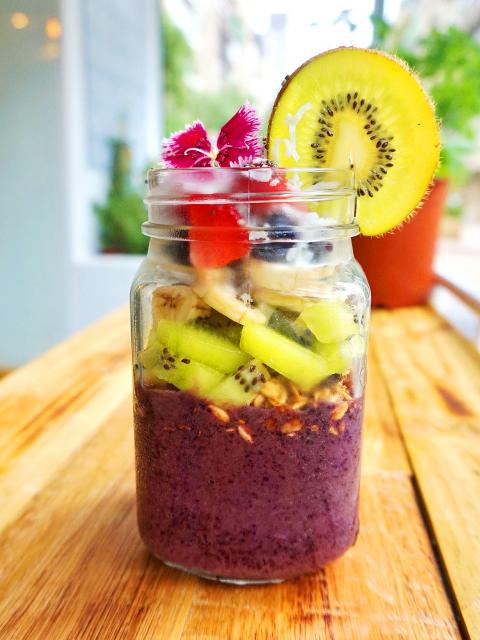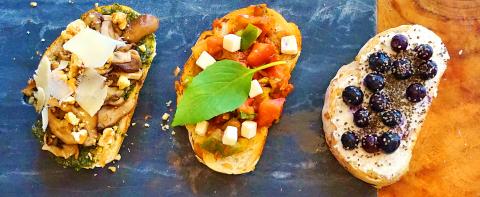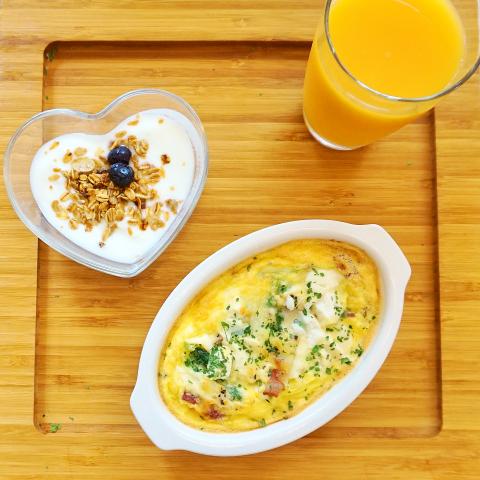Acai. Cultivated from the Brazilian Amazon, the berry was wildly popular among health-conscious yogis and runners in US cities like New York and San Francisco more than five years ago. The craze didn’t quite reach Asia, but a new haunt in Taipei is seeking to change this.
Tucked in a quiet alley minutes from the madness of Zhongxiao Fuxing MRT and furnished high and low with plants — plants in burlap sacks, plants in pots, plants in tabletop vases — Yucca Cafe makes it known that it’s all about the zen lifestyle. And, of course, acai. The menu includes a lengthy description of the super fruit, from cultivation methods in the Amazon Rainforest to the types of properties acai contains — iron, calcium, fiber, Vitamin A and lots of antioxidants. In other words, it’s very, very healthy.
The cafe is the brainchild of co-founder Fabio Grangeon. The Frenchman may be a TV show host, model and surfer (he spent part of his childhood in the Caribbean) but his dream has always been to open a restaurant. He started cooking when he was a child, helping his grandparents in the kitchen of their restaurant in Toulouse, and then working at Daylesford Organic in London’s Notting Hill in his late teens.

Photo: Dana Ter, Taipei Times
Moving to Taiwan five years ago to study Chinese, Grangeon says that he wasn’t exactly enamored by night market offerings. He often found himself eating sandwiches at Subway to get at least a few slices of lettuce in his diet. Fortunately, the last two years has seen the proliferation of more health-conscious cafes, making it much easier for him to maintain a healthy lifestyle.
Bits of Grangeon’s sensibility are interspersed throughout the cafe. Outside is a mini garden with lavender, basil and olives, and a little fountain — for fengshui — set against a blue-tiled walled that evokes southern France. The ceiling lights and mirror frames he carved from driftwood gathered from the beaches in Yilan.
Grangeon met Brazilian Tordan Ferreira while studying at Ming Chuan University, and earlier this year, the duo launched Purple Passion, a freeze-dried powder imported from Brazil and sold in Taiwan to use in acai juice and smoothies — the project was the prelude to Yucca Cafe.

Photo: Dana Ter, Taipei Times
Never mind the hefty price (NT$310), order the Acai Jar. Purple Passion powder is mixed with banana, almond milk, honey and acai fruit to create a luscious and refreshing drink with hints of natural sweetness. This is topped with kiwi, bananas, strawberries and granola. The trick is to mash it all up for the flavors (sweet, savory) and textures (soft, crunchy) to blend.
This is well complemented with the Yucca Toast (NT$380), a choice of three types of sweet or savory toast with toppings. One of my biggest peeves when it comes to bread is that it’s too dry or too hard, but the homemade whole wheat bread is superb.
From the sweet section, I opt for the ricotta, berries and chia seeds. The juiciness of the acai berry provides a pleasant contrast with the ricotta cheese, one of the milder types of cheese, and according to Grangeon, its chosen to suit local palates. Dribbled onto the toast, the chia seeds — not an easy to find ingredient — provide a little crunch and texture.

Photo: Dana Ter, Taipei Times
I also sample the homemade pesto, grilled mushroom, parmesan cheese and nuts from the savory section. The basil and olive oil are highly discernible in the pesto sauce, my favorite component of the toast. The grilled mushrooms are succulent, the parmesan cheese, thinly shredded is delightfully nutty though the nuts themselves — sprinkled atop the toast — are a little too sweet.
For my third toast, I choose the homemade dry tomatoes, basil jam and mozzarella, another savory option. Like the other two, flavor and texture are understated but sublime. It’s hard to go wrong with a dried tomatoes and mozzarella pairing, and the basil jam, another luscious taste, and also vaguely Mediterranean, is pleasantly herbal and savory.
The Acai Jar and Yucca Toast are both served all day. When it comes to ordering other food, it gets a little more confusing, as different dishes are served for brunch (10am to noon), afternoon tea (2pm to 5pm) and for lunch (noon to 2pm) and dinner (6pm to 8pm). Grangeon says this might change, and for now, it’s because they need to prep the veggies — all sourced from farmers in Yilan, Pingtung and Nantou — in the morning for the lunch and dinner menu.
Unfortunately, I arrive too early to order lunch. I had my eye on the Farmer Stew Beef (NT$380) because I can never say no to brisket and the Yucca Quinoa Salad (NT$360), quinoa being another rare ingredient. So I settle for the Healthy Frittata brunch set (NT$430). This is served with a choice of beverage (I pick orange juice) and a dessert (I opt for the yogurt granola).
The frittata, which consists of eggs, tomatoes, spinach, tofu, cheese and bread, isn’t as memorable as the Yucca Toast, but it’s still remarkably tasty and goes with Yucca’s ethos of packing in all the nutrients you need in a small, basic meal. I normally prefer much larger portions (this is coming from someone who can eat two briskets in one seating) but the frittata set is good for a pre-workout meal for the more health-conscious. Still, Yucca is all about the acai — order anything with acai and you can’t go wrong.

April 14 to April 20 In March 1947, Sising Katadrepan urged the government to drop the “high mountain people” (高山族) designation for Indigenous Taiwanese and refer to them as “Taiwan people” (台灣族). He considered the term derogatory, arguing that it made them sound like animals. The Taiwan Provincial Government agreed to stop using the term, stating that Indigenous Taiwanese suffered all sorts of discrimination and oppression under the Japanese and were forced to live in the mountains as outsiders to society. Now, under the new regime, they would be seen as equals, thus they should be henceforth

Last week, the the National Immigration Agency (NIA) told the legislature that more than 10,000 naturalized Taiwanese citizens from the People’s Republic of China (PRC) risked having their citizenship revoked if they failed to provide proof that they had renounced their Chinese household registration within the next three months. Renunciation is required under the Act Governing Relations Between the People of the Taiwan Area and the Mainland Area (臺灣地區與大陸地區人民關係條例), as amended in 2004, though it was only a legal requirement after 2000. Prior to that, it had been only an administrative requirement since the Nationality Act (國籍法) was established in

With over 80 works on display, this is Louise Bourgeois’ first solo show in Taiwan. Visitors are invited to traverse her world of love and hate, vengeance and acceptance, trauma and reconciliation. Dominating the entrance, the nine-foot-tall Crouching Spider (2003) greets visitors. The creature looms behind the glass facade, symbolic protector and gatekeeper to the intimate journey ahead. Bourgeois, best known for her giant spider sculptures, is one of the most influential artist of the twentieth century. Blending vulnerability and defiance through themes of sexuality, trauma and identity, her work reshaped the landscape of contemporary art with fearless honesty. “People are influenced by

The remains of this Japanese-era trail designed to protect the camphor industry make for a scenic day-hike, a fascinating overnight hike or a challenging multi-day adventure Maolin District (茂林) in Kaohsiung is well known for beautiful roadside scenery, waterfalls, the annual butterfly migration and indigenous culture. A lesser known but worthwhile destination here lies along the very top of the valley: the Liugui Security Path (六龜警備道). This relic of the Japanese era once isolated the Maolin valley from the outside world but now serves to draw tourists in. The path originally ran for about 50km, but not all of this trail is still easily walkable. The nicest section for a simple day hike is the heavily trafficked southern section above Maolin and Wanshan (萬山) villages. Remains of